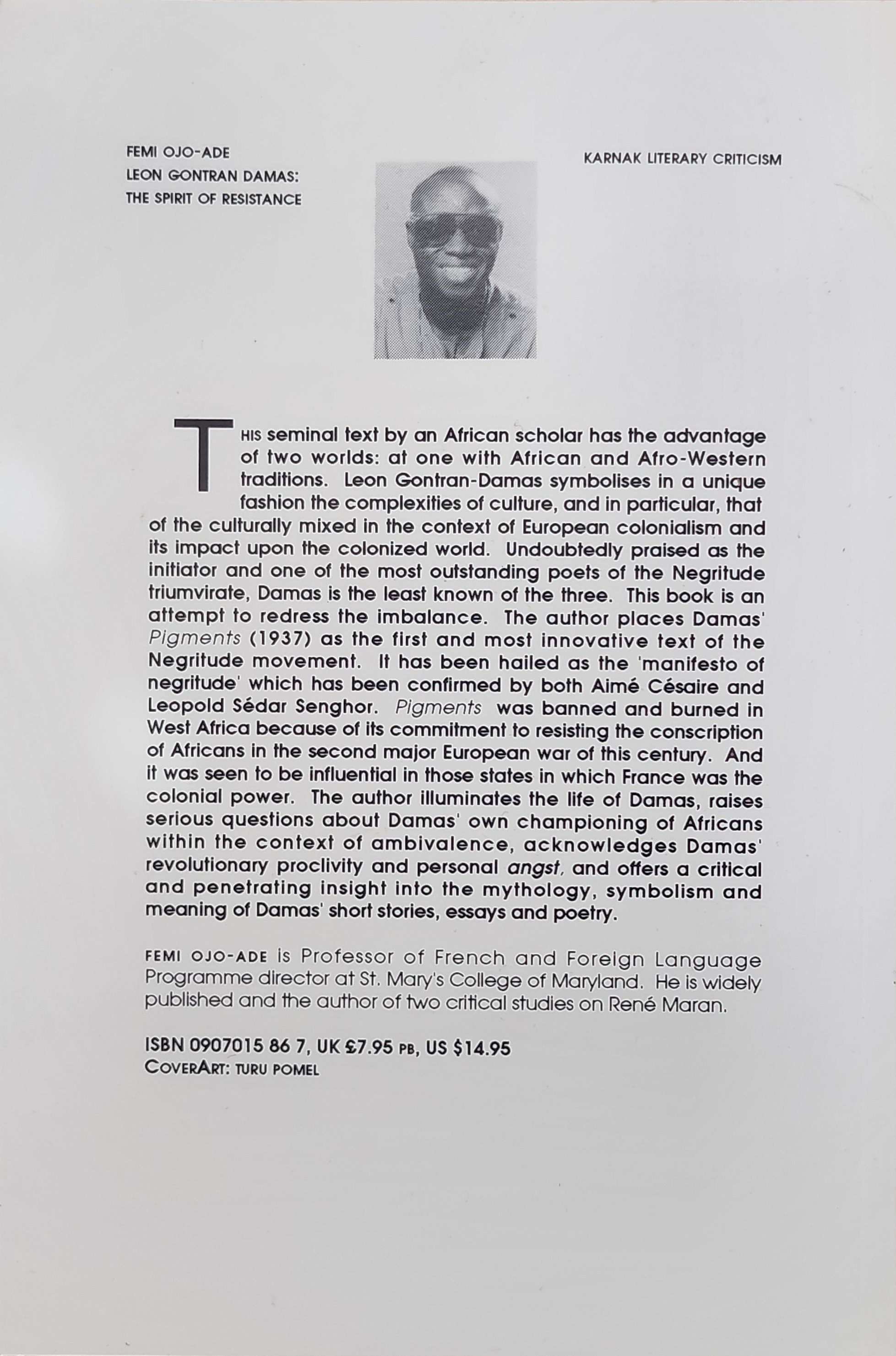 Image 1 of 2
Image 1 of 2

 Image 2 of 2
Image 2 of 2



LEON DAMAS SPIRIT OF RESISTANCE BY FEMI OJO ADE
This seminal text by an African scholar has the advantage of two worlds: at on with African and Afro-Western traditions. Leon Gontran-Damas symbolises in a unique fashion the complexities of culture, and in particular, that of the culturally mixed in the context of European colonialism and its impact upon the colonized world. Undoubtedly praised as the initiator and one of the most outstanding poets of the Negritude triumvirate, Damas is the least known of the three. This book is an attempt to redress the imbalance. The author places Damas' Pigments (1937) as the first and most innovative text of the Negritude movement. It has been hailed as the 'manifesto of negritude' which has been confirmed by both Aimé Césaire and Leopold Sédar Senghor. Pigments was banned and burned in West Africa because of its commitment to resisting the conscription of Africans in the second major European war of this century. And it was seen to be influential in those states in which France was the colonial power. The author illuminates the life of Damas, raises serious questions about Damas' own championing of Africans within the context of ambivalence, acknowledges Damas revolutionary proclivity and personal angst, and offers a critical and penetrating insight into the mythology, symbolism and meaning of Damas' short stories, essays and poetry.
FEMI OJO-ADE is Professor of French and Forelgn Language Programme director at St. Mary's College of Maryland. He is widely published and the author of two critical studies on René Maran.
This seminal text by an African scholar has the advantage of two worlds: at on with African and Afro-Western traditions. Leon Gontran-Damas symbolises in a unique fashion the complexities of culture, and in particular, that of the culturally mixed in the context of European colonialism and its impact upon the colonized world. Undoubtedly praised as the initiator and one of the most outstanding poets of the Negritude triumvirate, Damas is the least known of the three. This book is an attempt to redress the imbalance. The author places Damas' Pigments (1937) as the first and most innovative text of the Negritude movement. It has been hailed as the 'manifesto of negritude' which has been confirmed by both Aimé Césaire and Leopold Sédar Senghor. Pigments was banned and burned in West Africa because of its commitment to resisting the conscription of Africans in the second major European war of this century. And it was seen to be influential in those states in which France was the colonial power. The author illuminates the life of Damas, raises serious questions about Damas' own championing of Africans within the context of ambivalence, acknowledges Damas revolutionary proclivity and personal angst, and offers a critical and penetrating insight into the mythology, symbolism and meaning of Damas' short stories, essays and poetry.
FEMI OJO-ADE is Professor of French and Forelgn Language Programme director at St. Mary's College of Maryland. He is widely published and the author of two critical studies on René Maran.
This seminal text by an African scholar has the advantage of two worlds: at on with African and Afro-Western traditions. Leon Gontran-Damas symbolises in a unique fashion the complexities of culture, and in particular, that of the culturally mixed in the context of European colonialism and its impact upon the colonized world. Undoubtedly praised as the initiator and one of the most outstanding poets of the Negritude triumvirate, Damas is the least known of the three. This book is an attempt to redress the imbalance. The author places Damas' Pigments (1937) as the first and most innovative text of the Negritude movement. It has been hailed as the 'manifesto of negritude' which has been confirmed by both Aimé Césaire and Leopold Sédar Senghor. Pigments was banned and burned in West Africa because of its commitment to resisting the conscription of Africans in the second major European war of this century. And it was seen to be influential in those states in which France was the colonial power. The author illuminates the life of Damas, raises serious questions about Damas' own championing of Africans within the context of ambivalence, acknowledges Damas revolutionary proclivity and personal angst, and offers a critical and penetrating insight into the mythology, symbolism and meaning of Damas' short stories, essays and poetry.
FEMI OJO-ADE is Professor of French and Forelgn Language Programme director at St. Mary's College of Maryland. He is widely published and the author of two critical studies on René Maran.
